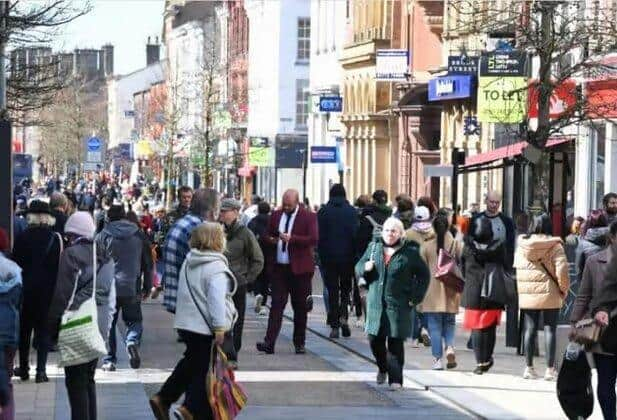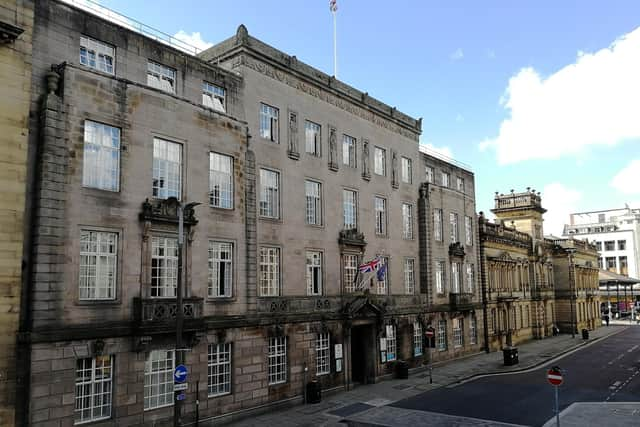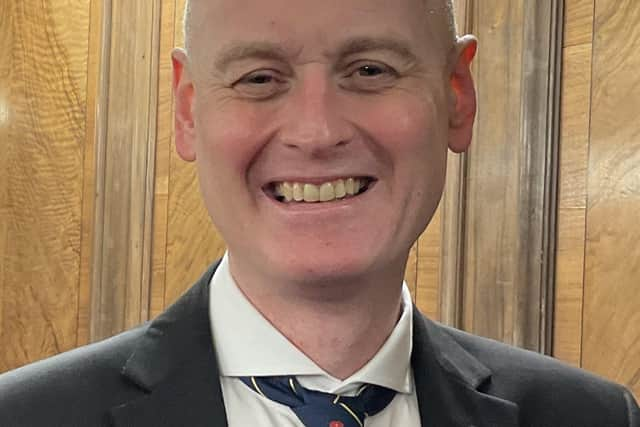Preston Model policy of community wealth building leaves residents 'happier, healthier and wealthier' - and on fewer antidepressants, research suggests
and live on Freeview channel 276
That was the conclusion of an academic study investigating the effects of a strategy that has become so closely linked with the city that it has been dubbed the “Preston Model”.
One of the report's authors told the Lancashire Post that 350 fewer people were now suffering from depression than would have been expected had Preston continued to follow the upward trend it had been on for similar areas prior to adopting the new approach.
Advertisement
Hide AdAdvertisement
Hide AdCommunity wealth building, as the policy is officially known, has been pursued by Preston City Council since the mid-2010s and seeks to ensure that more public money is spent and retained locally by encouraging other so-called “anchor institutions” - like the NHS, the University of Central Lancashire and Lancashire County Council - to follow its lead and use local firms when buying goods and services.


It also promotes better working conditions and recruitment practices amongst city employers, with the town hall itself having spearheaded that shift by beginning to pay the Living Wage more than a decade ago.
The recently published research into the impact of the strategy - which appeared in the prestigious Lancet Public Health journal - found that there had been a two percent relative reduction in depression in Preston compared to the likely rate “in the absence of the programme”.
The study also concluded that the level of antidepressant prescribing to the city’s residents had fallen by three percent between 2016 and 2019 - at a cost saving to the health service of £108,000 a year.
Advertisement
Hide AdAdvertisement
Hide AdMeanwhile, community wealth building was estimated to have led to a nine percent improvement in life satisfaction - as measured by the Office for National Statistics' annual population survey - and an 11 percent increase in median wages.


Professor Ben Barr, principle investigator for the University of Liverpool-led research, said that he was ”not necessarily surprised” at what had been discovered.
“It was encouraging that within a relatively short time period, we could start to see those improvements in mental health and wellbeing.
“It was likely that we were going to see…economic [benefits], but economic growth doesn't always translate into improvements in health and wellbeing,” Professor Barr noted.
Advertisement
Hide AdAdvertisement
Hide AdThe study - funded by the National Institute of Health Research - also discovered that there had been a greater reduction in the prevalence of depression in the most deprived areas within Preston.


However, there was no difference in the number of people having to attend hospital for mental health reasons, with the analysis suggesting that such severe problems may have had their roots in issues which could not be improved merely by council policy.
Nevertheless, Professor Barr stressed that the reductions noted in the study were not in cases of “mild depression”.
“[The figure relates to] people who are diagnosed with depression and receiving treatment for it - three hundred and fifty fewer people with depression in Preston than would be the case in the absence of those [policy] changes. That’s a lot of people's lives affected.
Advertisement
Hide AdAdvertisement
Hide Ad“The economy is one of the biggest determinants of mental health. It's the conditions in which people live [and] work - and their…financial security - that have a massive impact on people's mental health. We see that in recessions [when] mental health problems very quickly start increasing.”


The success - or otherwise - of the Preston Model has long been a source of political debate in the city, with the opposition Conservative and Liberal Democrat groups calling for an up-to-date and independent analysis of whether the Labour-run council’s pivotal policy was having the effects often attributed to it.
The study authors acknowledge that their work has some “limitations” - and that it cannot be said with complete certainty that the improvements seen since 2015 are “entirely related to the community wealth building programme”.
However, such improvements have not been observed in similar local authority areas, which acted as a control group for the research. A series of “robustness tests” were also carried out to reduce the risk of any unintended bias creeping into the assessment.
Advertisement
Hide AdAdvertisement
Hide Ad“The findings are consistent with Preston's community wealth building programme having led to economic improvements that have translated into improvements in mental health and wellbeing,” the paper concludes.
It notes that the timing of the estimated effects on mental health - coming between one and two years after economic changes - “is also plausible, based on previous research”.
Asked by the Post whether he believed that the study was clear evidence of the Preston Model working, Professor Barr said that it was “definitely a step in the right direction for getting that evidence”.


The indicators focused upon in the research show improvements in Preston that were not seen in those similar northern areas within the control group, which - like Preston - were in the 25 percent most deprived local authorities in England, but were not developing a community wealth building strategy.
Advertisement
Hide AdAdvertisement
Hide AdFollowing the introduction of the Preston Model, the antidepressant prescribing and depression prevalence rates in the city continued to rise in line with the trend seen since the start of the 2010s - but to a lesser extent than in the control areas.
Mental health in Preston is, in any case, worse than the England average, with an estimated 19 percent of the population having a common mental disorder, compared to 17 percent nationwide - a baseline which increases the potential benefits of any policy that might be able to reverse that situation.
The study revealed a major deviation between Preston and comparable areas when it came to the measure of life satisfaction. From 2015, it started to shoot up in Preston, almost reaching a score of 8 out of 10 by 2018 - and although it dipped slightly the following year, it remained well above the figure for the control group which fell consistently from 2016 and stood at around 7 out of 10 three years later.
Median wages also showed a major improvement, rising steeply in Preston from 2015, in contrast to a far slower growth for similar locations.
Advertisement
Hide AdAdvertisement
Hide AdA seven percent increase in employment was also noted, although that was not deemed statistically significant, because of uncertainty surrounding the estimate.
Professor Barr said that the research suggested that there “definitely seems to be something that's specific to what was going on in Preston” which accounted for the improvements witnessed.
To that end, he said, other places could do worse than follow Preston’s lead - although he recognised that there was not a “one-size-fits-all” solution to each area’s challenges.
The paper acknowledged it was possible that prioritising procurement from within the local economy could actually have "negative effects compared with more competitive national and international tendering of services - for example, favouring less efficient local enterprises could lead to reduced value for money".
Advertisement
Hide AdAdvertisement
Hide AdHowever, Professor Barr said that one of the most significant conclusions he had drawn was that the NHS could reap the benefits of its own commitment to community wealth building in the form of potentially reduced demand for its services as a result of improved health outcomes.
“That clearly has a knock-on effect [on] the NHS [which] potentially has an important role as a player in the local economy as well.
“Recognising that they can influence the economy in a way that also has health benefits is something that the NHS is getting around to…[and] there's a lot more that they could do to really fulfil that role,” said Professor Barr, who noted that the health service is one of the biggest employers in Preston.
He added: “The important thing is to think about how organisations - particularly public [sector] organisations - can help influence a local economy so it works for everyone.
Advertisement
Hide AdAdvertisement
Hide Ad“People who are planning economic strategies for places should ensure that health and wellbeing are...the primary goals of those strategies and look at how they can invest [in] and adapt local economies in a way that really maximises benefits for people's health and wellbeing."
‘IT'S JUST COMMON SENSE’’
Labour city council leader Matthew Brown, who has long championed the community wealth building policy with which Preston is now synonymous, said that the strategy is likely to be having a bigger effect now than it already was during the early years that were covered by the university research.
Initially, the focus of the Preston Model was on bolstering local supply chains by encouraging local procurement.
That work - which saw the city council band together with institutions including Lancashire County Council, Preston College, Cardinal Newman College, the University of Central Lancashire and social housing provider Community Gateway Association - has been broadened since the study period ended in 2019.
Advertisement
Hide AdAdvertisement
Hide AdCllr Brown said that it was heartening that the improvements in health and wellbeing which the research associated with the policy pre-dated the more “transformative ideas” pursued since, such as worker-owned co-operatives - which are now into double figures in the city - as well as working with key organisations to try to free up land for affordable housing.
“What we're doing now is really trying to build a more shared economy in Preston,” he explained.
The town hall leader contrasted the current approach with the years that the city was “pretty much on hold” during the 2000s as it waited for “large corporate developers to come in and regenerate the city centre” in the form of the ultimately ill-fated Tithebarn project to revamp the area around the bus station.
“Crucially, we would have lost control over where those supply chains went and so [since then] we took the decision to regenerate our city centre publicly. That started in 2014 with the markets - and it's continued since.”
Advertisement
Hide AdAdvertisement
Hide AdCllr Brown said of the community wealth building policy that the “intellectual arguments behind it” were perhaps less important than the “common sense approach” it represented.
PRESTON MODEL COULD JUST BE A “BACK SEAT PASSENGER” IN CITY’S SUCCESS
Speaking about the strategy at the Lancashire Post’s local election debate in May - after the research had appeared - opposition group leaders remained unconvinced.
“There’s no link,” Liberal Democrat leader John Potter said.
“What about other cities that don't have the Preston Model and also have really good outcomes?
Advertisement
Hide AdAdvertisement
Hide Ad“[Are Preston's improvements] down to the fact that the university has grown [or] is it down to the fact we've got excellent large-scale employers, like BAE?
“The problem is we don’t know - Labour loves to take credit for stuff, but they don't know.
“I'm getting kind of tired of the Preston Model stuff, because they go on talking about a [community] bank - which won't happen - and they have no actual statistical proof…whether [the policy] is driving these changes or is a passenger in the back seat of…changes that are already happening.
“I’m delighted that Preston is getting better and that outcomes are improving for people in our city, but I just don't think you can take credit for it if you don't have the evidence to do so,” said Cllr Potter, adding that the academic paper should be brought before the authority’s scrutiny committee so that it could be probed.
Advertisement
Hide AdAdvertisement
Hide AdConservative opposition group leader Sue Whiitam added: “Originally we were promised the evidence [about community wealth building when it was discussed at a scrutiny meeting] - and it never happened.
“I’d like to know how many companies in Preston have benefitted from their procurement [policies]. Because I do know that a lot of the jobs go to companies outside of Preston and, in fact, outside of Lancashire.
“[Labour] seems to be very good at spin - we just need to see the evidence. Like Cllr Potter, I want Preston to be a great city, I want us to benefit. But I’m not sure we’ve got the evidence that community wealth building is working in Preston,” Cllr Whittam concluded.
The Tory and Liberal Democrat groups were approached to offer fresh comment specifically for this piece.